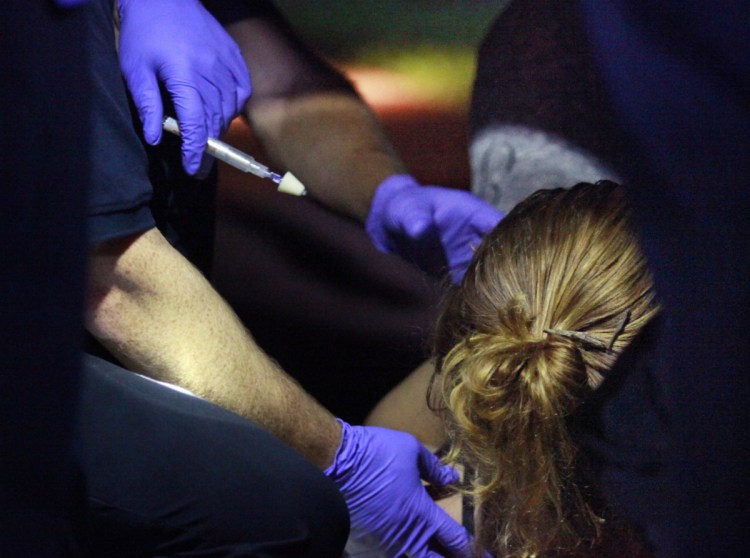It’s clear that Gov. LePage doesn’t care about the Mainers dying in the opioid epidemic – at least not as much as he cares about holding on to an outdated and ignorant view of addiction, or relitigating petty disputes with his political enemies.
We don’t know how many lives that indifference has cost, but it’s more than zero. And with every day he is allowed to block laws proven to save lives, he places more in danger.
It’s been more than five months since rules allowing the overdose-reversing drug naloxone to be distributed without a prescription were sent to the governor’s office for his approval. It’s been three weeks since the Press Herald first reported on the delay.
There’s a lot of confusion over the course of these events – most of it purposeful, it seems – but this much is certain: At any point in this process, the governor could have erased all question and put the rules in place.
Instead, we are left to shake our heads at the stupidity of it all. When heroin began flooding into our state, increasing access to naloxone – which, when administered, can instantly reverse an opioid overdose – should have been an easy first step. We should do what we can to keep people alive long enough to address their addiction – that should not have been in question.
But it was, because LePage believes that naloxone provides a crutch for drug users.
NO BASIS FOR THAT VIEW IN RESEARCH
That is not an opinion shared by experts in addiction or medicine. It is not backed by research or experience. But because it lives in the head of Maine’s chief executive, it holds sway.
LePage’s power was enough to block naloxone initiatives in the Legislature for a while, and since they were passed, he has used it to keep them from being implemented. Meanwhile, an average of one Maine resident a day dies of an overdose.
The rules on distributing naloxone without a prescription were passed by the Legislature last June and then approved by the Board of Pharmacy, which sent them to LePage for what amounts to a signature.
That final step is a formality, apparently part of a longstanding protocol but not required by law. Still, LePage has not acted.
Earlier this month, when asked about the delay, a LePage spokeswoman said the rules were in the governor’s office, pending review. A few days later, LePage himself said he did not know about the rules. Since then, neither he nor his office has agreed to clarify his position.
The Board of Pharmacy, comprised of LePage appointees and chaired by a political ally, has also refused to comment, except to say that it is awaiting the governor’s approval before publishing the rules.
On Monday, LePage told New England Cable News reporter Danielle Waugh that he’s never seen the rules, even inviting her into his office to show her they weren’t “on his desk.”
He then nonetheless offered a bizarre rationale for his opposition: Since Mainers ages 18 to 20 cannot buy cigarettes anymore – the result of a law passed last year, against the governor’s wishes, to raise the minimum age to 21 – then why should they be able to buy naloxone?
If his general objection to naloxone shows that the governor doesn’t understand addiction, then his latest tack shows he doesn’t understand chemistry.
MAINE FALLING BEHIND
Naloxone is a harmless chemical. You can’t get high on it; you can’t overdose on it. Unless you are in the throes of an overdose, it has no effect. It’s dangerous in the hands of an 18-year-old only if accidentally sprayed in an eye.
Not that we should even be having a debate over the efficacy of naloxone.
They’re not having it in the many states that are saving lives by handling naloxone distribution much better than Maine has. Nor are they having it in the Legislature, which passed these rules into law, or at the Board of Pharmacy, which approved them before they lost their collective spine.
Instead, the governor is standing in the way, playing dumb when one word from his office could end the whole thing. Still, he won’t act, just as he hasn’t acted on rules that would allow naloxone to be distributed to overdose prevention groups and needle exchanges, a law that was passed nearly two years ago. Two years.
He won’t do anything because he doesn’t care, not enough to get past his shallow views on naloxone and addiction, or to set aside his hostility toward the people who disagree with him on policy.
The Board of Pharmacy will take up the rules at its meeting Thursday, and it should approve the new rules then. It’ll be too late for some, though, and that’s on the governor.
Send questions/comments to the editors.



Comments are no longer available on this story